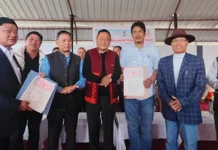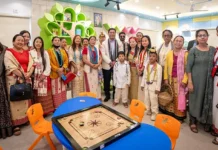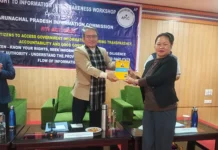HAYULIANG, 10 Sep: Anjaw deputy commissioner Millo Kojin appealed to the members of the Cultural and Literary Society of Mishmi (CALSOM), intellectuals, and youth to spearhead efforts to eradicate opium cultivation from the district, stating that opium, locally known as kani, is not part of Mishmi culture or tradition.
The DC warned that strict disciplinary action would be taken against government officials found addicted to opium under relevant provisions of the CCS Rules. He directed all head of departments to identify such officials.
He was addressing at an awareness programme against illicit poppy cultivation and drug abuse organized by the district administration in line with the resolution adopted during the 11th district level NCORD meeting.
Superintendent of police Anurag Dwivedi cautioned that strict legal action would be taken against individuals involved in illicit poppy cultivation under the NDPS Act. He urged all stakeholders to work collectively towards complete eradication of the menace.
Hayuliang ADC Julity Mihu emphasized the need for sustained awareness and coordination among the administration, community leaders, and youth to eradicate the drug problem.
DSP Habung Sama highlighted the legal provisions under the NDPS Act, underlining the severity of punishment for offenders. He also shared that more than 1,850 acres of illicit poppy cultivation had been destroyed in Anjaw district over the past five years, along with multiple cases being registered against culprits.
Senior medical officer Dr. Sogim Tayang sensitised the participants about harmful effects of drug and tobacco use, noting that addiction often begins with casual experimentation.
SJETA district nodal officer Baween Appa briefed the gathering on various initiatives under the Nasha Mukt Bharat Abhiyan, while Hayuliang SDAO Mennya Ete encouraged people to adopt alternative livelihoods such as agriculture, horticulture, and fisheries by utilising available government schemes.
Representatives from CALSOM and the Women Welfare Society suggested community-led strategies to tackle drug abuse and promote de-addiction.
The programme was attended by GBs, students, HoDs, and members of the Mishmi community. (DIPRO)




